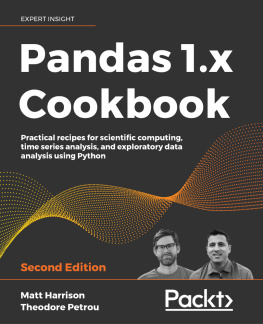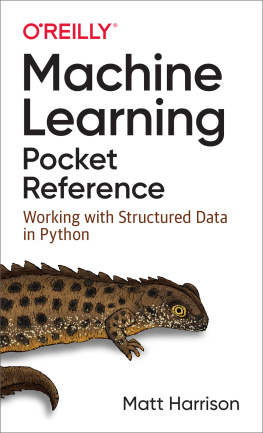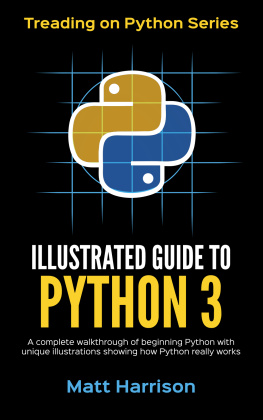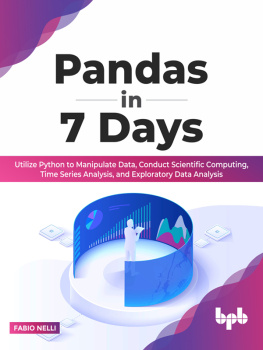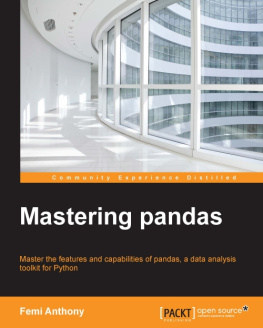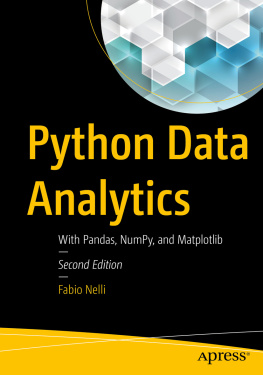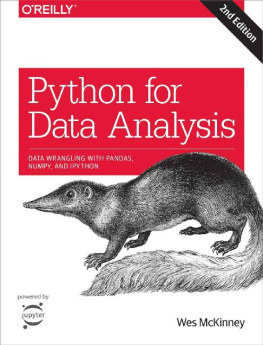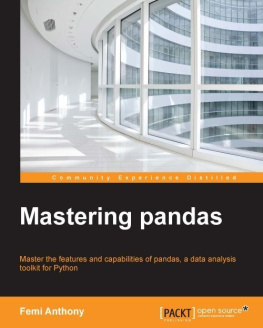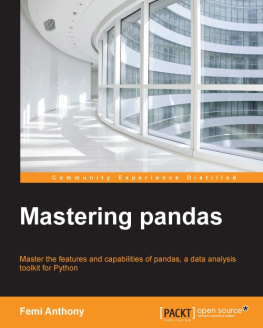Matt Harrison - Pandas 1.x Cookbook: Practical recipes for scientific computing, time series analysis, and exploratory data analysis using Python, 2nd Edition
Here you can read online Matt Harrison - Pandas 1.x Cookbook: Practical recipes for scientific computing, time series analysis, and exploratory data analysis using Python, 2nd Edition full text of the book (entire story) in english for free. Download pdf and epub, get meaning, cover and reviews about this ebook. year: 2020, publisher: Packt Publishing, genre: Computer. Description of the work, (preface) as well as reviews are available. Best literature library LitArk.com created for fans of good reading and offers a wide selection of genres:
Romance novel
Science fiction
Adventure
Detective
Science
History
Home and family
Prose
Art
Politics
Computer
Non-fiction
Religion
Business
Children
Humor
Choose a favorite category and find really read worthwhile books. Enjoy immersion in the world of imagination, feel the emotions of the characters or learn something new for yourself, make an fascinating discovery.
- Book:Pandas 1.x Cookbook: Practical recipes for scientific computing, time series analysis, and exploratory data analysis using Python, 2nd Edition
- Author:
- Publisher:Packt Publishing
- Genre:
- Year:2020
- Rating:4 / 5
- Favourites:Add to favourites
- Your mark:
Pandas 1.x Cookbook: Practical recipes for scientific computing, time series analysis, and exploratory data analysis using Python, 2nd Edition: summary, description and annotation
We offer to read an annotation, description, summary or preface (depends on what the author of the book "Pandas 1.x Cookbook: Practical recipes for scientific computing, time series analysis, and exploratory data analysis using Python, 2nd Edition" wrote himself). If you haven't found the necessary information about the book — write in the comments, we will try to find it.
Use the power of pandas to solve most complex scientific computing problems with ease. Revised for pandas 1.x.
Key Features- This is the first book on pandas 1.x
- Practical, easy to implement recipes for quick solutions to common problems in data using pandas
- Master the fundamentals of pandas to quickly begin exploring any dataset
The pandas library is massive, and its common for frequent users to be unaware of many of its more impressive features. The official pandas documentation, while thorough, does not contain many useful examples of how to piece together multiple commands as one would do during an actual analysis. This book guides you, as if you were looking over the shoulder of an expert, through situations that you are highly likely to encounter.
This new updated and revised edition provides you with unique, idiomatic, and fun recipes for both fundamental and advanced data manipulation tasks with pandas. Some recipes focus on achieving a deeper understanding of basic principles, or comparing and contrasting two similar operations. Other recipes will dive deep into a particular dataset, uncovering new and unexpected insights along the way. Many advanced recipes combine several different features across the pandas library to generate results.
What you will learn- Master data exploration in pandas through dozens of practice problems
- Group, aggregate, transform, reshape, and filter data
- Merge data from different sources through pandas SQL-like operations
- Create visualizations via pandas hooks to matplotlib and seaborn
- Use pandas, time series functionality to perform powerful analyses
- Import, clean, and prepare real-world datasets for machine learning
- Create workflows for processing big data that doesnt fit in memory
This book is for Python developers, data scientists, engineers, and analysts. Pandas is the ideal tool for manipulating structured data with Python and this book provides ample instruction and examples. Not only does it cover the basics required to be proficient, but it goes into the details of idiomatic pandas.
Table of Contents- Pandas Foundations
- Essential DataFrame Operations
- Creating and Persisting DataFrames
- Beginning Data Analysis
- Exploratory Data Analysis
- Selecting Subsets of Data
- Filtering Rows
- Index Alignment
- Grouping for Aggregation, Filtration and Transformation
- Restructuring Data into a Tidy Form
- Combining Pandas Objects
- Time Series Analysis
- Visualization with Matplotlib, Pandas, and Seaborn
- Debugging and Testing Pandas
Matt Harrison: author's other books
Who wrote Pandas 1.x Cookbook: Practical recipes for scientific computing, time series analysis, and exploratory data analysis using Python, 2nd Edition? Find out the surname, the name of the author of the book and a list of all author's works by series.

